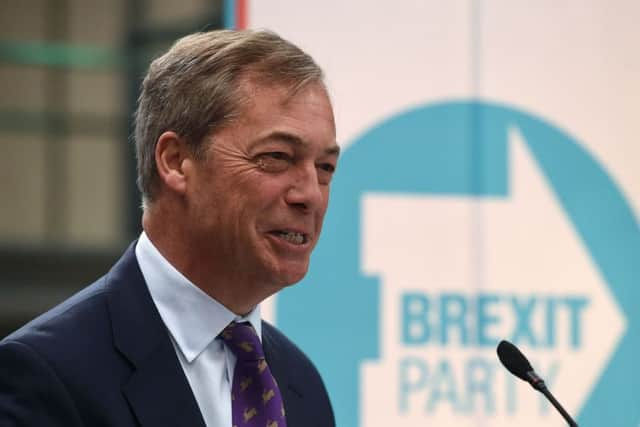Election pact with Nigel Farage ‘only way to deliver Brexit’
Calling for the deselection of Tory parliamentarians who oppose a no-deal exit from the EU, the Brexiteer MP said his party should form a Liberal-SDP style pact to carve up seats between them.
Polls suggest the Brexit Party, already set for victory in this week’s European elections, would beat the Tories in a snap general election, potentially putting Jeremy Corbyn into power.
Advertisement
Hide AdAdvertisement
Hide Ad“You’re not going to get Brexit through this parliament,” the Brexiteer Tory said. “We need new MPs.


“As soon as it becomes obvious that the next leader can’t get a deal through parliament, we’ll have a general election. And the only way we’ll win it is if we work with the Brexit Party.”
In a scathing attack on Conservative HQ, the Brexiteer MP said there should be a “purge” of pro-EU MPs ahead of an election. “A lot of our MPs aren’t even conservatives, they’re liberals,” they said.
In a speech today, Chancellor Philip Hammond will warn that “the populist right” is seeking to “hijack the result of the referendum” by advocating a no-deal Brexit.
Mr Hammond will add that “there is a real risk of a new prime minister abandoning the search for a deal, and shifting towards seeking a damaging No-Deal exit as a matter of policy … in order to protect an ideological position which ignores the reality of Britain’s economic interests and the value of our Union.”
Yesterday Esther McVey launched what amounts to her pitch for the party leadership, setting out a platform for “Blue-collar Conservatism” that appeals to working-class voters.
At an event attended by more than a dozen MPs including housing minister Kit Malthouse and former Tory leader Iain Duncan Smith, the former work and pensions secretary said there must be “no more backsliding” on leaving the EU, even if it means doing so without a deal on 31 October.
Ms McVey claimed some of her former Cabinet colleagues were seeking to “dismantle” Brexit and insisted the next leader of the Conservatives must be somebody who “believes in Brexit” and has the “passion” to drive it forwards.
Advertisement
Hide AdAdvertisement
Hide AdThe former work and pension secretary, who quit the Cabinet over Brexit in November, told an event in Parliament that it is “not an easy time” to be a Tory activist.
“Our failure to deliver Brexit has left many feeling demoralised, with no obvious light at the end of the tunnel, and most of us know that ahead of us is still a bumpy ride,” she said.
In a sign of the deep divisions in the Conservative party, a rival launch of a “One Nation” Tory “Declaration of Values”, attended by 30 MPs including Ms McVey’s successor Amber Rudd, heard a warning that the group would never endorse a leadership candidate who backed no deal.
Cabinet will discuss whether to offer MPs a menu of Brexit options at today,sCabinet meeting and will consider the possibility of holding indicative votes in an effort to break the Commons deadlock over leaving the EU.
The legislation for the Brexit deal – the Withdrawal Agreement Bill (WAB) – is due in the Commons in the week beginning 3 June and faces stiff opposition following the failure of cross-party talks to reach a compromise.
The Prime Minister’s official spokesman was unable to say when the WAB will be published, with work still being carried out on the legislation.
Asked how the WAB would be different to the deal previously rejected by MPs three times, the spokesman added that ministers have had “good discussions with the opposition in relation to areas such as workers’ rights and environmental protections”.